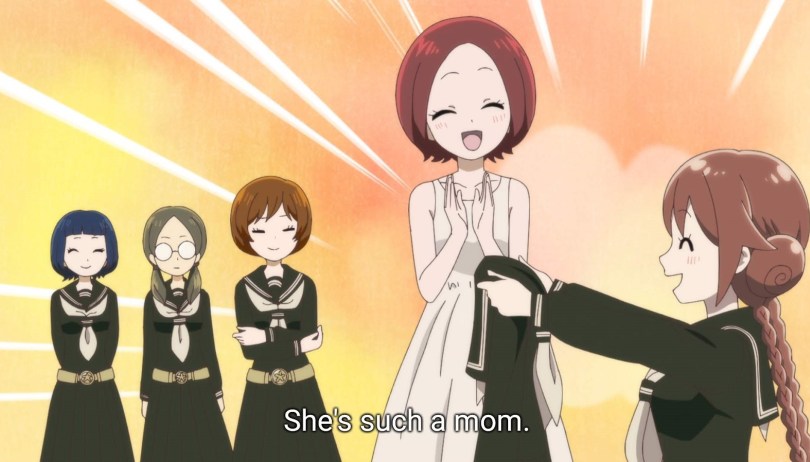Content considerations: Depictions of ableism, depression, verbal abuse, neglect, and bride-buying; age-gap romance between teenagers (14 and 17).
What’s it about? Set in early 1920s Japan, the story follows Tamahiko, a well-to-do student whose future plans are upended after he loses both his mother and the use of his right hand in a car accident. His family all but disowns him, sending him to their isolated villa in the mountains—but his life changes once more when Yuzuki appears on his doorstep, explaining that she’s the bride his father purchased for him.
Inside Taisho Otome Fairy Tale there are two rom-com wolves. One is about two marginalized people abused by the dominant power structures finding comfort and fulfillment with one another. The other is about an idealized wife-girl fixing a sad disabled boy with her love.
And folks, after just one episode, I can safely say I have no gosh-danged earthly clue which one of these wolves is gonna win this fight.

Taisho Otome is a minefield, albeit a charming one that I confess to enjoying maybe more than I should have. There’s just such an earnest sincerity to this premiere, though, especially when it’s depicting Tamahiko’s trauma and depression.
While perhaps a bit overwrought at times, the recurring, intrusive memories of his family abandoning him because of his disability ring with emotional truth, as do his insomnia-filled nights and passive suicidal thoughts. The clear depiction of internalized ableism and self-loathing go a long way towards making him a believably wounded protagonist who struggles to connect with and trust others for very valid reasons, instead of just being a stereotypical Grouchy Loner.

MAYBE. SHUT UP.
The rom-com premise of this fairy tale is, ah… messier, we’ll say. The bride-buying element is troublesome (Yuzuki’s family marries her off to pay their debts), but it’s also realistic to the time period, and it helps that neither of them are comfortable with the arrangement. As long as it’s thoughtful about its subject matter and sympathetic to its characters (which, so far, I’d say it is), there can be a lot of value in using historical fiction to explore how people navigated oppressive systems.
Of course, there’s also the matter of Tamahiko being 17 and Yuzuki only 14. I don’t have the energy to get into age-gap discourse today (I’ve played that song before), but suffice to say that while three years isn’t much in the grand scheme of things, there’s a big developmental gap at those specific ages, a fact that’s only made more obvious by how small and childlike Yuzuki looks in comparison. The camera doesn’t ogle her and Tamahiko lets her set the pace of their relationship, but combined with the bride-buying aspect it does lead to the sense of uncomfortably skewed power dynamics.
Granted, the series doesn’t call out the gap, instead playing Tamahiko as so sheltered and insecure that he seems an even match for the more matter-of-fact (albeit idealistic) Yuzuki… which mostly begs the question of why the author didn’t just make them the same age in the first place. It’s not a deal-breaker for me at this point, but as is always the case with this fraught topic, everyone’s mileage will vary.

Honestly, though, I’m way less worried about the historical elements than I am about Yuzuki’s characterization. For the majority of this premiere, she comes across as a romanticized, virtuous mother/bride, laser-focused on taking care of her betrothed. Her biggest flaw is an obliviousness to personal boundaries and casual ableism (she invades Tamahiko’s bath and insists on washing his back), but even that’s depicted as coming from a selfless desire to care for him.
There are hints that there’s more depth to her: she seems to miss going to school and seeing her friends, and later admits that she didn’t want this marriage anymore than he did. It’s possible her wholehearted devotion is a coping mechanism for having her life upended. Unfortunately, her relentless positivity combined with most of the episode being told from Tamahiko’s perspective tends to drown out those flickers of vulnerability and nuance.
This could be a Fruits Basket situation where Yuzuki learns how to stay true to her nurturing nature while also speaking up about her own wants and needs, but it’s too early to say yet. Taisho Otome will need to give us more facets to her character to keep this from becoming an Oedipal mother/wife fantasy—or, equally unpleasantly, an able-bodied savior sweeping in and rescuing the poor disabled outcast.

And yet, for all those myriad concerns, I have to circle back to my earlier statement: I liked this premiere. It performs a delicate balancing act between quiet drama and bright comedy, similarly balancing its protagonist’s prickly exterior with sympathetic depictions of depression and bursts of casual kindness. It utilizes well-worn rom-com misunderstandings but centers them around the characters’ feelings rather than just functioning as gags (Tamahiko frantically trying to figure out how to Do The Sex is surprisingly endearing), allowing the episode to highlight the awkwardness of arranged marriages without the skeevy undertones so common in shows like these.
The premise is riddled with potential pitfalls and Yuzuki absolutely needs more development, but with thoughtful plot and character progression, this could turn into a very sweet tale of two people mistreated by their families finding a new family with one another. Maybe I’m as naive as our protagonists, but dang it, folks, I wanna believe.

So, to conclude: is Taisho Otome Fairy Tale worth your time?
Ask me again after three episodes.






Comments are open! Please read our comments policy before joining the conversation and contact us if you have any problems.